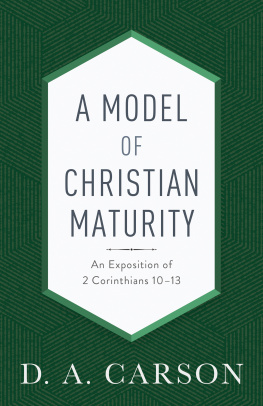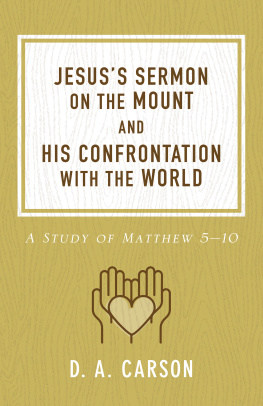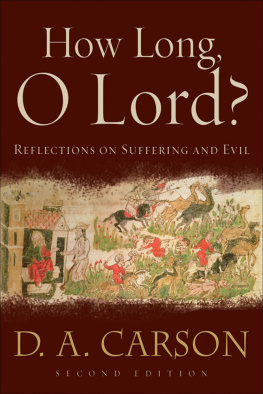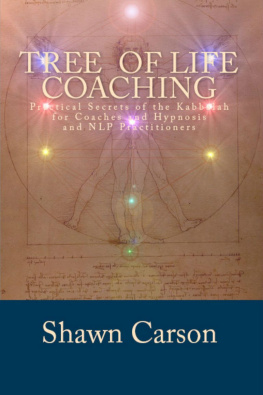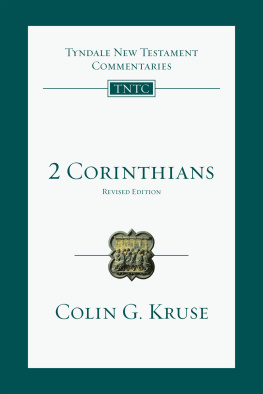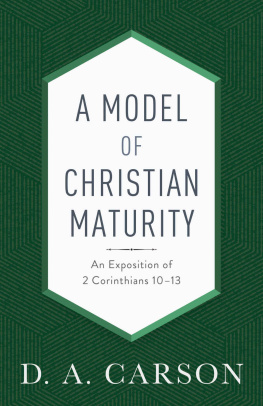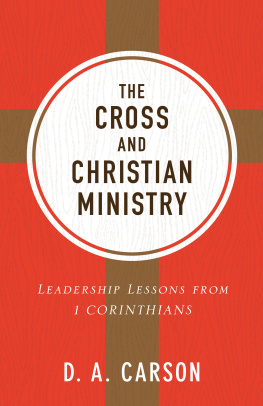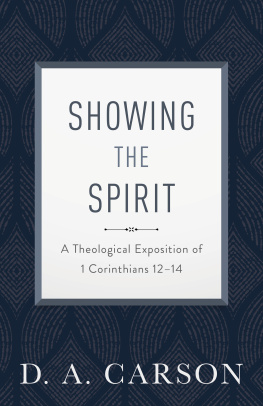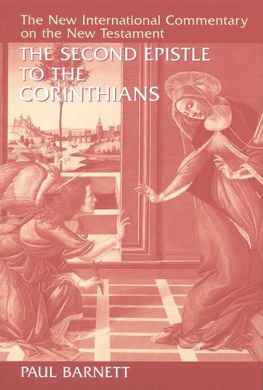1. Orientation to 2 Corinthians 1013
2. Disobedience versus Discipline: An Appeal for Obedient Faith (10:16)
3. The Ugliness of Spiritual One-Upmanship: How Not to Boast in the Lord (10:718)
4. The Danger of False Apostleship: Overturning False Criteria (11:115)
5. Triumphalistic Qualifications: Answering Fools according to Their Folly (11:1633)
6. Destroying Super-Spiritual Visionaries: Boasting in Weakness (12:110)
7. Open Rebuke: The Failures of the Corinthians and the Motives of the Apostle (12:1121)
8. Warning and Prayer: Aiming for Maturity (13:114)
Preface
I love the apostle Paul. Some people cannot understand my love. They find Paul angular, merely intellectual, intimidating, even arrogant. My response, firmly stated, is that they do not know him.
Despite my love for Paul, I have written very little about him. For one reason or another, my attention during the past dozen years has largely been devoted to Matthew and John, or to broader New Testament themes. Nevertheless I have taught the Pauline corpus to successive generations of seminary students and preached through several of his epistles to various congregations. Preparing for such assignments has gradually exposed me to substantial parts of the vast literature that has grown up around the Acts of the Apostles and the epistles of Paul. I do not claim to have mastered all of that literature, but I have come to know Paul a little better. And truly to know him is to love him.
Arguably, the most intense chapters in all of his writings are those studied here, viz., 2 Corinthians 1013. Certainly they reveal more about Paul himselfhis sufferings, values, motives, wrestlings, and self-perceptionsthan any other four chapters of comparable length; yet far from promoting egocentricity, they point unerringly to Jesus Christ and to what it means to be a Christian. Moreover, this short part of Scripture speaks volumes to the modern church, especially in the West; so I resolved with Gods help to devote the next volume in this series to these chapters.
Most of the material in this book has been the stuff of sermons in churches and conferences in Canada, America, and England. It has been worked over afresh for the printed page; but I have retained the movement from exegesis to application that serves as one of the markers distinguishing sermon from lecture. My hope is that this will encourage Christians, not only to read the Bible in its own historical and theological context, but to apply it with sensitivity and discernment to their own lives and to the modern church. I hope as well that some readers will come to love Paul as I do. There is little danger that such love would ever prove idolatrous; for to know Paul is to learn he puts no stumbling block in anyones path (2 Cor. 6:3) and to discover that imitating him points us away from him to imitating the Lord Jesus Christ (1 Cor. 11:1). If that is what we begin to learn, Paul himself would be overjoyed.
I am very grateful to Marty Irwin for her customary skill and courtesy in transforming my manuscript into the millions of electrical blips the computer understands, and thus preparing the work for publication.
Soli Deo gloria.
D. A. Carson
Trinity Evangelical Divinity School
This is not a technical commentary, and so I have avoided the detailed references of that genre. When the two earlier volumes in the series were published, however, several readers suggested I might provide a list of English commentaries. I have adopted that suggestion, and have occasionally quoted choice passages from them, identifying the work by the authors name only. By and large I have avoided explicit reference to foreign-language works, journal articles, and the like, even though I have frequently interacted with their substance. There were two foreign-language commentaries I could not bring myself to eliminate from the following list of cited sources.
Allo, E. B. Saint Paul: Seconde Epitre aux Corinthiens . Paris: Gabalda, 1956.
Barrett, C. K. The Second Epistle to the Corinthians . London: Black, 1973.
Beet, J. A. II Corinthians . London: Hodder and Stoughton, 1982.
Bengel, J. A. Gnomon of the New Testament . Vol. 3. Edinburgh: T and T Clark, 1857.
Bruce, F. F. 1 and 2 Corinthians . London: Oliphants, 1971.
Calvin, John. II CorinthiansPhilemon . Edinburgh: Oliver and Boyd, 1964.
Denney, James. II Corinthians . London: Hodder and Stoughton, 1894.
Fausset, A. R. II Corinthians. Commentary on the Bible . London: Collins, 1874.
Goudge, H. L. II Corinthians . London: Methuen, 1927.
Harris, M. J. 2 Corinthians. The Expositors Bible Commentary . Vol. 10. Grand Rapids: Zondervan, 1976.
Henry, Matthew. Commentary on the Whole Bible . London: Fisher, 1845.
Hodge, Charles. II Corinthians . London: Banner of Truth, 1959.
Hughes, Philip E. Pauls Second Epistle to the Corinthians . Grand Rapids: Eerdmans, 1962.
Lietzmann, H. An die Korinther I, II . Tuebingen: J. C. B. Mohr, 1969. (Supplemented by W. B. Kuemmel.)
Menzies, Allan. II Corinthians . London: Macmillan, 1912.
Meyer, H. A. W. Critical and Exegetical Handbook to the Epistles to the Corinthians . Edinburgh: T and T Clark, 1964.
Robertson, A., and A. Plummer. 2 Corinthians . Edinburgh: T and T Clark, 1915.
Waite, J. 2 Corinthians . London: John Murray, 1881.
Wilson, Geoffrey. 2 Corinthians: A Digest of Reformed Comment . Edinburgh: Banner of Truth, 1973.
Orientation to 2 Corinthians 1013
W e increasingly inhabit a time and place in Western history when humility is perceived to be a sign of weakness; when meekness is taken for a vice, not a virtue; when puff is more important than substance; when leadership, even in the church, frequently has more to do with politics, pizzazz, and showmanship, or with structure and hierarchy, than with spiritual maturity and conformity to Jesus Christ; when the budget is thought to be a more important indicator of ecclesiastical success than prayerfulness and when loose talk of spiritual experience wins an instant following, even when that talk is mingled with a scarcely concealed haughtiness that has learned neither humility nor tears. To Christians hungry to understand and repent of these evils, 2 Corinthians 1013 speaks with rare power and passion.

